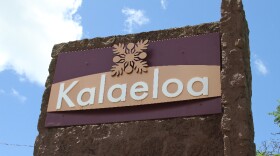Housing Maui wildfire survivors has been a focal point as the state works toward recovering from last year's fires. The state is building 450 units at its Ka La’i Ola project. Nearby, a FEMA development called Kilohana will have 169 modular units.
The Council for Native Hawaiian Advancement is also getting in on the mix, aiming to construct 66 modular units spread across two projects in Lahainaluna and Central Maui: La’ikū and Ke Ao Maluhia. Applications are now being accepted for those developments.
The Conversation talked with CNHA CEO Kūhiō Lewis about the interim housing projects for Maui survivors.
Interview Highlights
On the need to build mid-term housing for Maui wildfire survivors
KŪHIŌ LEWIS: We had a housing crisis before the fire. So whether it's housing teachers, whether it's workforce housing, there will be a need for this housing regardless. But the houses are being built for the purpose of housing survivors, using money that we've raised for that purpose as well. So we want to make sure we hit the mark to the degree that we can. I feel confident that what is being built, whether it's the governor, whether it's CNHA, or whoever, I think the amount of units that are being built will satisfy the need. And I say that because the plan here is, initially the challenge was everybody was in hotels, so now they're in short-term rentals, or they're in some one-year lease. They need to go somewhere. So these houses are being built in accordance to where they're currently living, to prepare them for mid-term support, which is what these houses are intended for. It's not long-term. These houses are not long-term. They are mid-term support. So we're preparing for them to come out of those one-year leases into these more mid-term housing options. And so these mid-term houses that we are building, these modulars, these ADUs, they're intended to house them for up to five years. The ultimate goal is to get them to something permanent, to get folks back on their land, or to prepare the bigger market for permanency.

On making the modular units fire resistance
LEWIS: That's a big concern of ours, too. Of course, they've been traumatized, and so making sure that the homes that we're putting them in are fire-resistant is important. So that's working with whoever you're acquiring the modular units from. I will say that there were various efforts that were explored, typically on the continent, and we've learned a lot, by the way, in terms of recovery works. They move in a bunch of mobile homes, like on wheels and that's where they place people, while everything gets sorted out. That's not really feasible for Hawaiʻi. Can you imagine thousands of mobile homes on the island? What would you do with them? Where would you put them, or where would you even after five years is up? We had to be a little more creative and aggressive in the modular units... We did a huge assessment of all of the different modular options, and we ended up employing multiple modular companies just because they couldn't crank out the numbers that we needed.
On how the fire has affected housing for all Maui residents
LEWIS: We're making sure that they're as safe as possible for these families, as recovery efforts continue. If you think about it, a lot of the survivors from Lahaina or even Kula are actually living in long-term rentals that likely would have gone to someone living in other areas, Kahului. The market's just tied up. So you're going to see more and more generational living in a single house. So the fire has impacted the entire island, not just Lahaina and Kula, because there's no inventory for others to move in to at this point. So the faster we can get these houses online, the more stable it becomes, not just for them, but for the rest of the county.

On how the fire has revealed deeper housing problems
LEWIS: I didn't realize that 30% of our housing was short-term rentals on Maui. I think if I knew that, I think if we knew that, we would have spoken up a lot sooner and called for change. This fire in Maui has really opened everyone's eyes to some challenging policies and practices that have been in place that need to be addressed. And I think what it's doing is it's setting the path for the rest of the state to take a deep look at what's really going on and what we need to be doing in this moment to support ourselves and address the problems that we're all facing.
This interview aired on The Conversation on Aug. 20, 2024. The Conversation airs weekdays at 11 a.m. on HPR-1. Tori DeJournett adapted this story for the web.




